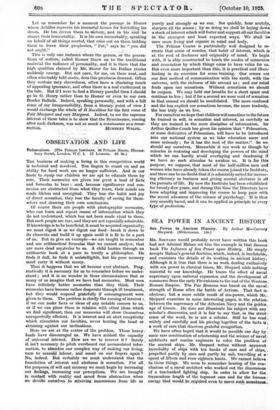SEA POWER IN ANCIENT HISTORY
sia Power in Ancient History. By Arthur MacCartney Shepard. (Heinemann. l5s.j .
MR. SHEPARD would probably never have written this book had not Admiral Mahan set him the example in that famous book The Influence of Sea Power upon History. He simply: accepts Mahan's general doctrine, which, indeed, is irrefutable, and examines the details of its working in ancient -.history. Although it is true that there is no work dealing exclusively with sea power in classical times, Mr. Shepard adds nothing - material to our knowledge. He traces the effect of naval: supremacy upon national expansion and the development of , commerce from the early Phoenicians to the end of the Western Roman Empire. The Pax Romana was based on the naval : strength of Rome after the battle of -Actium. That fact is obvious; but a more subtle result of sea-power, which Mr.; Shepard examines in some interesting, pages, is the relation between the supremacy of the. Athenian Navy and the golden age of Greece. He does not illuminate his subject with any scholar's discoveries, and it is fair to say that, in the strict sense of the word, he is' not a scholar. Still he has read widely and carefully and his piecing together of the facts is a work of care that deserves grateful recognition.
We have often hoped that it would be possible one day by some rare combination of scholarship and the science of naval architects and marine engineers to solve the problem of the ancient ships. Mr. Shepard writes without apparent iecredulity of ships with ten banks of oars and of ships, : propelled partly by oars and partly by sail, travelling at a speed of fifteen and even eighteert.knots. We cannot believe in these things. We seem to remember hearing of the con-
clusions of a naval architect who worked out the dimensions of a ten-banked fighting ship. In order to allow for the ,
tremendous length of the topmost oars and for the human - energy that w.010 e.Irluired even to move such monstrous., instruments he concluded that the vessel would be such a thing as one could see only in a nightmare—about half a mile long and carrying thousands of men. The ancients thought In Dreadnoughts—which Mr. Shepard spells throughout " Dreadnaughts "—as easily as our own generation has done. But did they go further than thinking about eight- or ten- bankers ? Practice proved that the queen of the seas was the trireme. It had the perfect union of manageability and speed. When the rowers were fresh and the sail was set before a strong following wind the speed of an ancient ship was undoubtedly high, though it must be remembered that the faster the ship went with the aid of the wind the greater was the difficulty in getting the oars in and out of the water quickly enough to apply a stroke of any power.
The strange thing is that naval ships between the ancient era and the introduction of steam lost rather than gained mobility. A Greek trireme in a calm could still manoeuvre fast under her oars, but one of Nelson's ships in a calm was helpless. It is curious that from say the fourteenth to the eighteenth centuries there was no serious attempt to apply any kind of mechanical propulsion by means of hand-power to at least the smaller ships Of war. That may astonish us, but it is still more remarkable that the ancients did not discover how to make a ship sail close-hauled. To a slight extent no doubt they made their ships sail on the wind, but tacking was unknown. One reason for this failure, of course, was that the vessels were habitually drawn up on a beach at night and the troops and rowers rested on the land. The vessels therefore had no keels.
It is interesting to compare the naval methods of the Greeks and the Romans. The Greeks were natural seamen in a sense that the Romans were not. This difference is hard to account for, as the Romans, as much as the Greeks, had the sea at their doors. The original method of fighting among the Greeks was to turn a sea battle into the equivalent of a land battle by boarding the enemy's ships and fighting as though on land. The Greeks, however, soon developed naval tactics and killed their enemies or rammed their ships without actually being laid along side. The Romans when they seriously took to the sea practised the original method of sea fighting because they understood no other. They could fight only as soldiers. In their turn, nevertheless, they discovered that naval supremacy required greater subtlety, and one of the most stirring periods in history was when they borrowed from Carthage the arts of seamanship, of naval architecture and of sea tactics, in order to beat that mighty enemy.
One point must not be forgotten and it is not often enough mentioned by naval writers. Sea-power can discover and claim territory, but an army is necessary to hold it. The principle is illustrated in different ways by the history of all wars conducted by sea-Powers. Nelson made it impossible at Trafalgar for Napoleon to win ; yet the French Wars were not finished, and could not be finished, till Wellington had triumphed at Waterloo.



























































 Previous page
Previous page